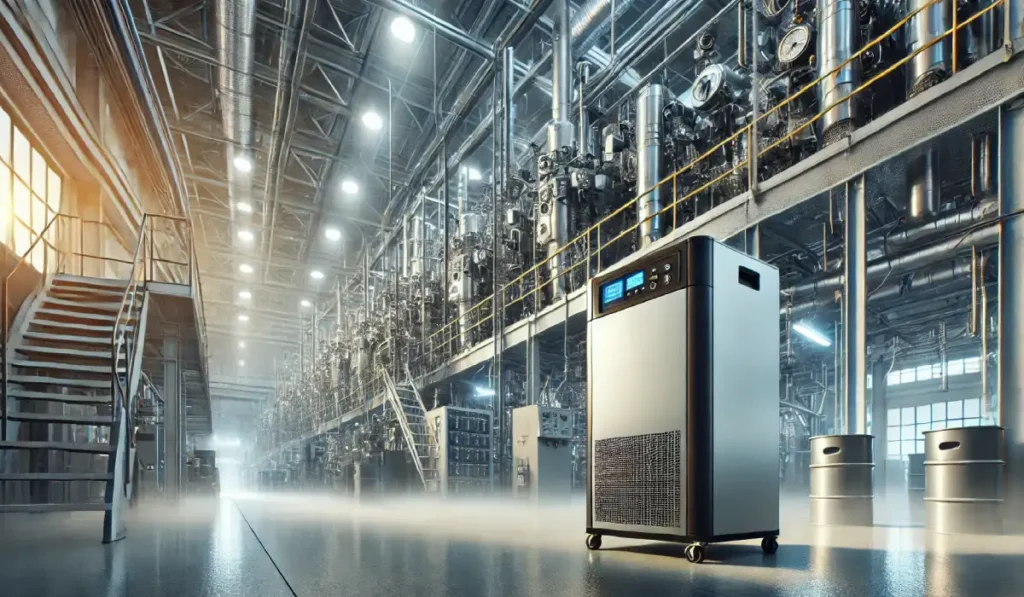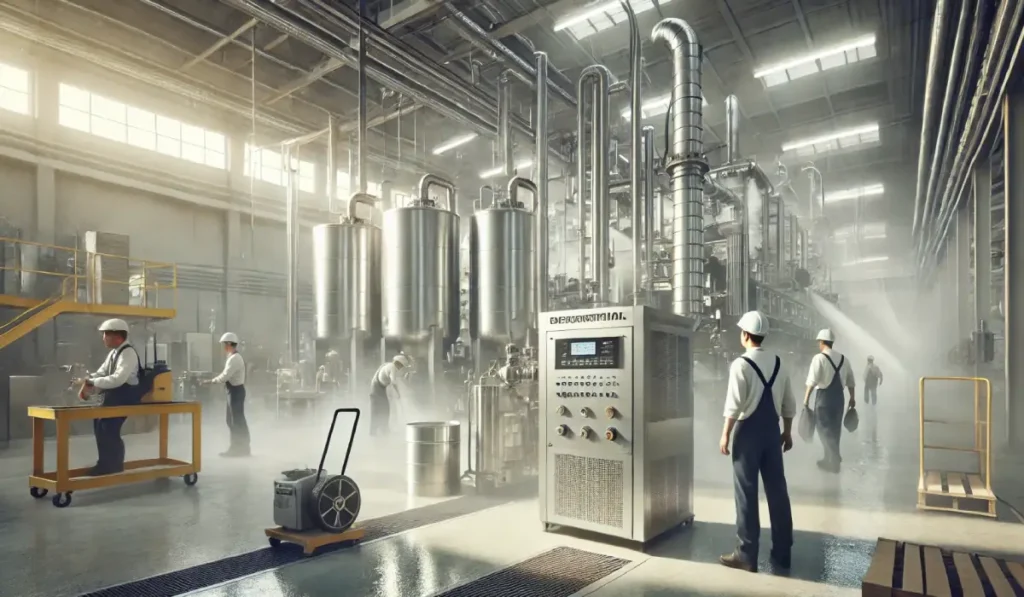How Industrial Dehumidifiers Prevent Equipment Damage & Corrosion?
Have you ever wondered how something as simple as humidity could threaten the heart of your industrial operations? From machinery breakdowns to product degradation, the impact of excess moisture on your equipment and products can be far-reaching and costly.
In industries ranging from pharmaceuticals to food processing, even the slightest fluctuation in humidity can lead to major setbacks. But here’s the good news: industrial dehumidifiers can help you combat these challenges, ensuring your operations run smoothly and efficiently.
In this blog, we’ll explore the hidden dangers of high humidity, how it affects your equipment, and why investing in the right dehumidifier is more important than ever. Ready to discover how you can protect your business and boost productivity? Let’s dive in!
The Impact of Humidity on Industrial Equipment
In any industry, efficiency depends on well-functioning equipment. But when humidity levels rise, machinery can slow down, malfunction, or even corrode, leading to costly downtime and frequent repairs. As a result, excess moisture doesn’t just affect performance; it threatens the longevity of your most valuable assets.
The impact extends beyond machinery. In pharmaceutical plants, humidity can degrade medicines, while in food processing, it increases the risk of contamination. Electronics manufacturing faces corrosion issues, and in textile or paper industries, moisture weakens materials, causing defects. Even automotive plants struggle with rust formation on metal components.
Without proper humidity control, industrial operations face serious setbacks, reduced efficiency, product defects, and rising maintenance costs. Preventing moisture related damage is not just an option, it’s a necessity to keep your industry running smoothly.

The Role of Dehumidifier to Prevent Equipment Corrosion and Damage
To prevent your industrial equipment from damage and corrosion dehumidifiers play an important role. It helps you in removing moisture from the air to keep your inventory and equipment safe from any damage and corrosion. In this part, we will learn how to reduce equipment corrosion in factories and above more that helps in,
1. Prevents Corrosion on Machinery
Humidity is a silent killer of industrial machinery. Over time, excess moisture causes metals to corrode, weakening equipment and leading to expensive repairs or replacements. For industries relying on heavy machinery, like automotive or metalworking, this can be disastrous. By maintaining the right humidity levels, you can prevent corrosion in factory machines using dehumidifiers, ensuring your machinery runs smoothly and lasts longer, saving you time and money on unnecessary repairs.
2. Protects Electrical Systems from Moisture Damage
Electrical systems are the backbone of most industrial operations, but humidity can wreak havoc on them. Moisture can cause short circuits, corrosion, and even fires. Imagine the chaos if your production line stops because of an electrical failure. Dehumidifiers are essential in keeping electrical components dry and functioning properly, offering peace of mind that your operations will continue uninterrupted and safe.
3. Maintains Product Integrity in Sensitive Industries
In industries like pharmaceuticals, food processing, and electronics, humidity can directly impact the quality of your products. A small fluctuation in moisture levels can cause pharmaceuticals to lose their potency, food to spoil, or electronics to malfunction. Industrial dehumidifiers act as guardians of your products, ensuring they stay in perfect condition, compliant with regulations, and ready for the market without compromising quality.
4. Preserves Industrial Coatings, Paints and Lubricants
High humidity can ruin the protective coatings on machines, leading to peeling, bubbling, and exposing metal to rust. It can also break down lubricants, increasing friction and wear on moving parts. By keeping moisture at bay, industrial dehumidifiers ensure coatings stay intact and lubricants perform efficiently, preventing costly breakdowns and extending the life of your machinery. Your equipment stays protected, and your operations run without a hitch.
5. Reduces Equipment Downtime and Maintenance Costs
Nothing disrupts production like equipment failure, and high humidity is a leading cause of malfunctions. Rust, electrical issues, and breakdowns are all linked to excess moisture. With a dehumidifier in place, you minimize the risks of downtime and the costs of repairs. Fewer breakdowns mean more productivity, and your bottom line benefits from the increased efficiency and reduced maintenance expenses.
6. Prevents Mold, Fungal, and Bacterial Growth
Excess humidity doesn’t just harm equipment—it also creates the perfect breeding ground for mold and bacteria. This can ruin products, contaminate raw materials, and even pose serious health risks to workers. Dehumidifiers not only protect your equipment but also ensure a healthier, cleaner work environment. With moisture-controlled air, you can prevent mold and mildew growth, keeping your products and workplace safe from contamination.
7. Enhances Workplace Safety and Comfort
A damp, humid environment isn’t just uncomfortable for workers; it’s also hazardous. Slippery floors, rusted equipment, and poor air quality all contribute to workplace accidents. By removing excess moisture from the air, industrial dehumidifiers create a safer, more comfortable environment. Your employees will appreciate the improvement in air quality and working conditions, which translates to increased productivity and fewer accidents.
8. Improves Energy Efficiency of Industrial Equipment
Humidity forces machinery to work harder, using more energy to maintain performance, which leads to higher utility bills. Industrial dehumidifiers help reduce the moisture in the air, enabling your equipment to operate more efficiently and consume less energy. This results in lower energy costs, reduced wear and tear on your equipment, and a greener, more cost-effective operation.
9. Ensures Compliance with Industry Regulations
For industries like pharmaceuticals and food production, maintaining specific environmental conditions is a legal requirement. Excess humidity can throw these conditions off balance, resulting in non-compliance and potential fines. Dehumidifiers ensure your facility meets industry standards for humidity control, keeping your business in the clear and preventing costly regulatory issues that could hurt your reputation and profitability.
10. Protects Raw Materials and Inventory Storage
Humidity can cause irreversible damage to raw materials and inventory—whether it’s metal, paper, textiles, or chemicals. Materials exposed to high moisture levels can spoil, rust, or degrade, leading to wasted resources and increased costs. Industrial dehumidifier to prevent equipment corrosion and damage helps in maintaining optimal humidity levels, ensuring that your inventory stays in top condition and ready for use, preventing product loss and preserving the integrity of your raw materials.

The Benefits of Using Industrial Dehumidifiers
Industrial dehumidifier for equipment protection offer numerous benefits, including protecting equipment from corrosion, improving product quality, and reducing downtime. They also enhance energy efficiency, ensure regulatory compliance, and maintain a safe, comfortable work environment, ultimately boosting productivity and lowering operational costs.
- Prevents corrosion, rust, and wear on industrial machines, extending their lifespan and reducing maintenance costs.
- Ensures sensitive products in industries like pharmaceuticals, food processing, and electronics remain intact, safe, and compliant with regulations.
- Minimizes equipment breakdowns and expensive repairs, improving productivity and operational efficiency.
- Maintains a healthier work environment by controlling moisture levels and reducing the growth of mold, mildew, and bacteria.
- Reduces the strain on equipment, helping it run more efficiently and consume less energy, leading to lower operational costs.
- Helps industries meet required environmental standards, avoiding fines and ensuring the integrity of products.
- Safeguards materials from moisture damage, ensuring their longevity and preventing product loss.
- Minimizes hazardous conditions like slippery floors, rusted structures, and mold growth, creating a safer, more comfortable environment for employees.
- Creates a more pleasant environment for workers by controlling humidity, leading to improved morale and productivity.
- Reduces the risk of contamination due to humidity, protecting your products from spoilage or degradation.
How to Choose the Right Dehumidifier for Your Industry?
Choosing the right dehumidification systems for industrial use involves considering several key factors to ensure optimal performance and efficiency. It’s essential to assess your specific environmental needs, including the size of the space, moisture levels, and industry regulations. The right dehumidifier will not only protect your equipment but also improve product quality and help maintain a safe, comfortable work environment. While choosing the best dehumidifiers for equipment rust, key factors you should consider are:
Capacity
Choose a dehumidifier that fits the size of your space and handles the moisture levels specific to your industry. Whether it’s a small workshop or a large factory, make sure it can keep everything running smoothly.
Type of Dehumidifier
Depending on your needs, select between refrigerant and desiccant dehumidifiers. Refrigerant models are great for everyday moisture control, while desiccant types work best in colder environments or more sensitive areas.
Energy Efficiency
Go for energy-efficient models that reduce your operating costs, especially if you manage a large-scale operation. This not only saves you money but also supports your sustainability goals.
Operating Environment
Think about the unique conditions in your industry—whether you’re dealing with fluctuating temperatures, high humidity, or corrosive substances. Pick a dehumidifier that’s built to thrive in these environments.
Maintenance Needs
Some dehumidifiers need more attention than others. Select a model that fits your team’s ability to maintain it, so you can count on reliable performance without hassle.
Industry Compliance
Ensure the dehumidifier meets industry-specific regulations, particularly in highly regulated sectors like pharmaceuticals, food processing, or electronics. This way, you’ll keep products safe, maintain quality, and stay compliant with the law.
Where to Find The Best Dehumidifiers in Bangladesh?
When looking for top-quality dehumidifier for industrial equipment in Bangladesh, HVAC Chittagong stands out as a trusted provider. With their expertise in humidity control and dehumidification solutions, they offer a range of high-performance dehumidifiers suited for various industries.
Whether you’re in need of industrial, commercial, or residential solutions, HVAC Chittagong provides expert advice, reliable products, and seamless installation services to ensure optimal moisture control for your business. Their extensive knowledge in humidification and dehumidification systems ensures that you’ll find the best solution tailored to your specific needs.
Final Thought
Maintaining optimal humidity levels in industrial environments is crucial for protecting equipment, ensuring product quality, and enhancing operational efficiency. High moisture levels can lead to corrosion, breakdowns, and even product degradation, making humidity control not just a luxury but a necessity.
Industrial dehumidifiers play a pivotal role in safeguarding your machinery, electrical systems, and inventory from moisture-related damage. By choosing the right Industrial Dehumidifier provider tailored to your specific industry needs, you can reduce downtime, lower maintenance costs, and ensure a safer, more productive work environment. Trust HVAC Chittagong’s expertise in humidity control solutions to provide you with reliable products that keep your business running smoothly and efficiently.
Keep Your Machinery Rust-Free! Invest in a Dehumidifier for Ultimate Protection
FAQs
An industrial dehumidifier helps regulate the moisture levels in large spaces, ensuring your machinery runs smoothly and products remain in top condition. It reduces the risk of moisture-related damage, safeguarding equipment, inventory, and the overall working environment.
Yes, industrial dehumidifiers play a crucial role in preventing rust. By controlling the moisture in the air, they protect metal parts from the corrosive effects of excess humidity, ensuring that your equipment stays rust-free and functions properly over time.
To protect machinery from moisture, using an industrial dehumidifier is essential. Also, applying protective coatings, conducting regular maintenance, and ensuring proper ventilation in the facility can further help reduce the impact of humidity on your valuable assets.
Industrial dehumidifiers are highly reliable in large-scale operations. They efficiently remove excess moisture from the air, minimizing equipment downtime, product spoilage, and environmental hazards. Their performance depends on the dehumidifier’s capacity and the specific conditions of your industry, but they offer a robust solution for humidity control.
